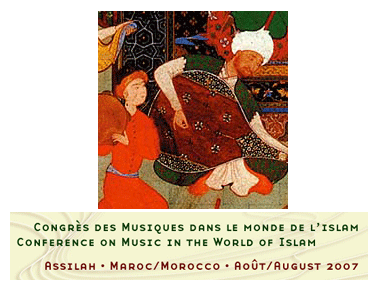
A year ago from August 8-13 an international conference on “Music in the World of Islam” was held in Assilah, Morocco, jointly sponsored by The Assilah Forum Foundation (Assilah, Morocco) and the Maison des Cultures du Monde (Paris, France). The papers from this conference are now available in pdf format online. Music and dance are described for Afghanistan, Algeria, Andalusia, Azerbeijan, Bangladesh, Bosnia, Central Asia, East Africa, Egypt, Ethiopia, India, Indonesia, Iran, Iraq, Kurdistan, Kuwait, Liberia, Malaysia, Morocco, Russia, Syria, Tajikistan, Turkey and Yemen.
A description of the conference is described by its main organizer, Pierre Bois:
At the dawn of the 21st century and 75 years after the Congress of Arab Music (Cairo, 1932), it seemed necessary to examine the state of musical traditions in the world of Islam. The situation of these musical traditions changed considerably after the Second World War due to the independence movements, the Cold War, the non-aligned country policies, and the development of the media and globalization. New issues are now appearing with the concepts of cultural diversity, the protection of intangible cultural heritage and sustainable development. Various approaches have been adopted in different countries and cultures, and these merit consideration and comparison.
The goal of this Conference was to encourage the vitality and the diversity of the traditions and musical practices of the world of Islam today and to promote greater circulation of knowledge and practices in a spirit of tolerance and mutual recognition.
The Conference program was based around three major topics which reflect the main current concerns of musicians and researchers and also those who invest in the musics of this region and who are concerned about the future of these traditions and their evolution in a context that is experiencing profound changes: associations, teachers, distributors, political decision-makers, etc.
The first topic, Music Across Borders, sought to give an appraisal of the musical relationships that have been formed and continue to be formed between different regions of the world of Islam: circulation of musical forms, musical knowledge, exchanges, influences, appropriations, etc.
The second topic, Making music, was both a survey of today’s traditions and a series of reflections on the evolution of musical tradition, innovation and creation.
The third topic, Music, Society and Power, covered various sociological issues that are often crucial nowadays: the role of music in the building of identities, the effect of social changes on musical practice and repertoires, the role of women and children, the relationships between music, religion and power.
The Conference ended with a discussion open to all on the development of ethnomusicological research in the Arab world and more generally in the world of Islam.
These six days provided an opportunity for these hundred-odd participants and observers from all over the world to share their knowledge and experiences.
Pierre Bois